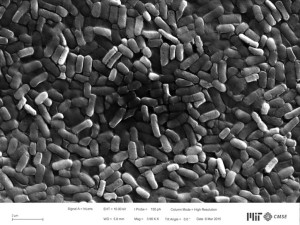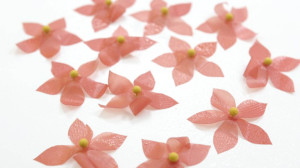
Initiated in the MIT Media Lab, and supported in part by sportswear company New Balance, bioLogic is an effort to program living organisms and invent responsive and transformable interfaces of the future. At the crux of this effort is the discovery of a new behavior of an ancient bacteria: the expansion and contraction of the natto cells relative to atmospheric moisture.
These animate cells are harvested in a bio lab, assembled by a micron-resolution, bio-printing system and transformed into responsive fashion (a “second skin”). Researchers can now observe the self-transforming biological skin activated by living bacteria. The synthetic bio-skin reacts to body heat and sweat, causing flaps around heat zones to open, enabling sweat to evaporate and cool down the body through an organic material flux.
Tangible Media Group at the MIT Media Lab is leading the project in collaboration with MIT Department of Chemical Engineering, the Royal College of Art and New Balance. The team members come from diverse backgrounds including design, art, science and engineering.

The bio-hybrid film can be utilized in other contexts as well: The action of bio-hybrid flowers blossoming and wilting; a living tea leaf could signal through transformation when the tea is ready; or a lampshade could sculpt light activated by the light bulb.
“Imagination unfolds the power of the tiny bacteria,” the researchers website declares.
 TEXTILES.ORG
TEXTILES.ORG


